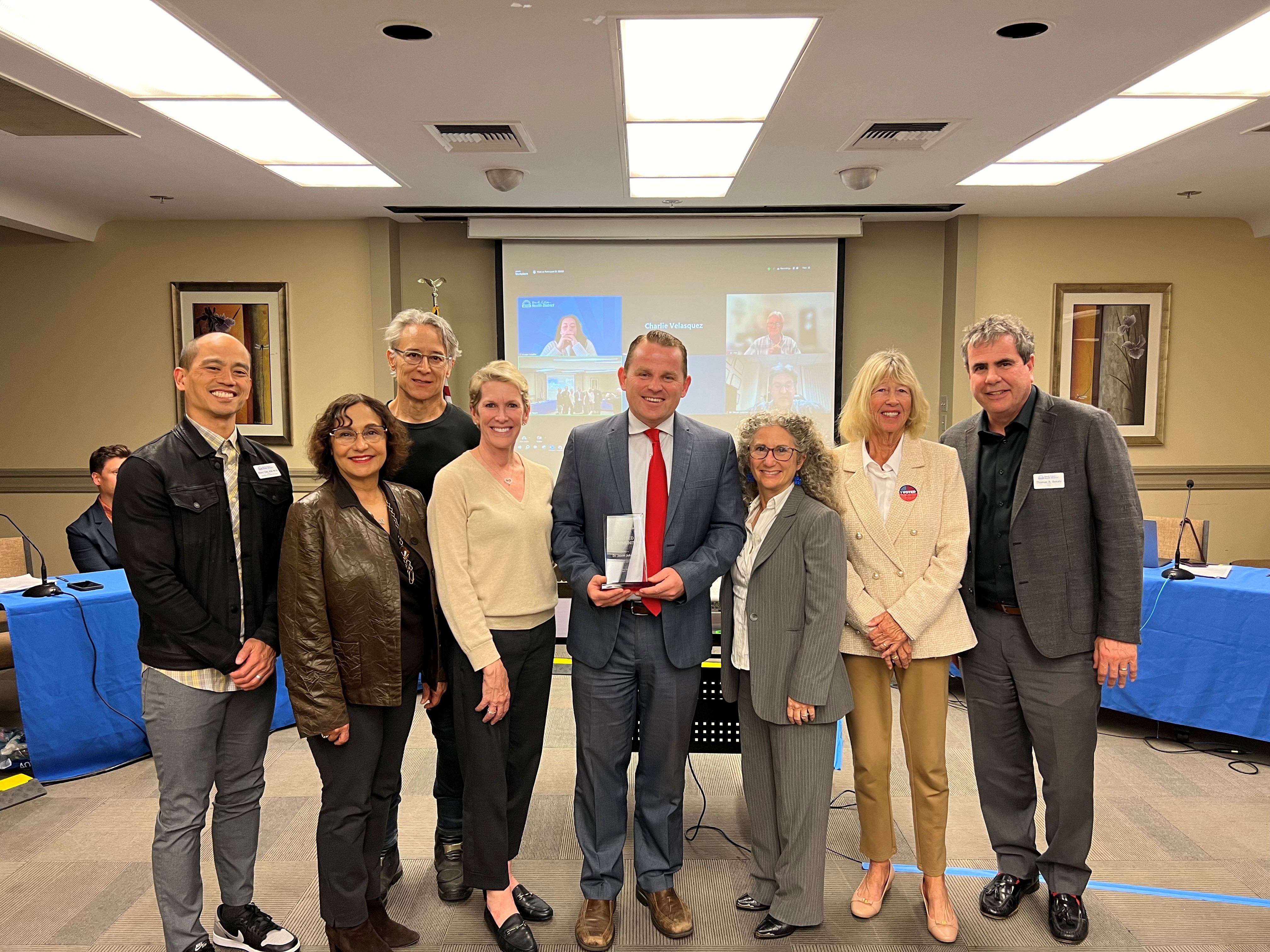Director Jack Messenger is gung-ho on the musical that’s based on the novel by Louisa May Alcott

“Some years ago, Lois and I went to New York on one of our little Broadway junkets,” says Jack Messenger. “We went there ostensibly to see ‘Wicked’ and a few other things. I like the talkies, Lois likes the musicals – so we agreed to see a couple of talkies and then a couple of musicals.
“One of the musicals we had heard of was ‘Little Women,’ which was then in previews. It starred Sutton Foster doing Louisa May Alcott’s classic, only written to music. I’d heard that [Foster] was a tremendous talent; she was fresh off of winning her Tony Award for ‘Thoroughly Modern Millie.’”
Jack Messenger and his wife, Lois Bourgon, are both actors and have appeared in various South Bay theater productions for years and years. More to the point, they have been intimately involved with staging work – from classics to world premieres – at the Manhattan Beach Community Church.
So now we’re back in New York and Messenger has discovered that half-price tickets are available for “Little Women.”
“I got tickets in the eighth row,” he says, about to describe the epiphany fast approaching: “I’m looking at the show, I’m looking at this stunning performance by Sutton Foster as the indomitable Jo March, and then I’m looking at this pop singer by the name of Maureen McGovern singing the role of Marmee. And I’m looking at Lois, and I’m looking at the show, and I’m looking at the staging of the show, and I said: ‘You know, this could work on a community theater level, and I think we could probably do this at the church one day.’”
Messenger pauses, and maybe for dramatic effect because he is, after all, an accomplished actor.
“One day,” he intones. He said that, he points out, because at the time he imagined that “Little Women” would go on to be a Broadway smash, with a long run followed by endless national tours and revivals, meaning that the rights to do it locally would not become available until sometime in the next century. It would also mean that Bourgon might never get the chance to play Marmee.
“Of course the show ended up failing,” Messenger says, “because it ran a poor second to ‘Wicked.’ Same demographics: Young women, young girls, ages 12 to 34.” Given a choice, audiences opted for the glitz and glitter and big budget of ‘Wicked’ over the girls-in-tatters story of “Little Women.”
The show ran from January to May, 2005, but in Broadway terms it closed early. Critics weren’t blind to its assets, however, and Sutton Foster was nominated for a Tony Award and Maureen McGovern for a Drama Desk Award. Later that summer a national tour kicked off in San Diego, without stopping in Los Angeles. Eventually, according to Messenger, there was a treatment of the show at the Lyric Theatre in L.A. and another at the Chance Theater in Anaheim. A couple of colleges, he says, have done it as well.
Even so, Messenger retained a special fondness for the show.
Seasons passed. And then…
“An opportunity presented itself years later when the church was looking for a musical. There were grumblings within the church that they were starting to lose some church members due to just age and turnover and that kind of thing. They were thinking about wanting to bring in new members and fresh blood, and that’s when my ears perked up and I said: I think I’ve got the perfect show for you.”
More than pretty faces
“Little Women,” Messenger says, “is a coming of age story about a brassy tomboy named Jo and her sisters, along with her mother (Marmee) who inspired her to become one of the great writers of the 19th century.” Alcott’s semi-autobiographical novel was published in 1869 and it emerged during the hardships of the Civil War at a time when too many able-bodied men were fighting and dying, and women were expected to remain faithful wives and mothers. Traditional family values are at the core of the story, which makes it even more of a challenge for the main character to pursue her dreams and destiny.
“This girl, Jo March, everybody’s saying ‘Go get married and be taken care of for the rest of your life,’ but she’s going, No, I don’t want to do that; I want to be a writer and I want to see the world.’ And so she did.”
Little Women has remained popular for a century and a half. There have been plays and movies based on the book, and this writer even recalls seeing Mark Adamo’s 1998 opera based on the story, presented by Opera Pacific at the Irvine Barclay Theatre in May of 2001.
As for the musical, Jason Howland wrote the music, Mindi Dickstein the lyrics, and Alan Knee the book. The tale is set in Concord, Massachusetts from 1864 to 1867.
Although a musical based on four sisters and their loving mother seems easy enough to dismiss as light fare, Messenger found deeper levels and important meaning in the work.
“It features something that is not full of papier-mâché characters, say in a picture book story, which a lot of musicals are. They’re fluff, and everybody goes there to be entertained. I appreciate entertainment as much as the next person, but what I want to do in addition to that is engage them. And if I can engage them with something that’s thoughtful as well as being entertaining, if I can create some discussion on the way out (of the theater), then I’ve killed two birds with one stone and I’ve given them twice the value for their money.”
A musical with substance; I like that, I tell him.
“That’s why you and I like shows like ‘Parade’ and ‘Ragtime,’” Messenger replies. And if “Little Women” can be referenced in the same breath as these two works then we know we’re in good company.
Setting the scene
Now, a Broadway budget is one thing, but the resources for a community theater production is going to be something else. Although Messenger saw “Little Women” on stage just that one time in New York, he’s poured over a DVD of it “again and again and again. And quite frankly I love that show so much that I pretty much borrowed from the Broadway show. I’ve even taken some of the choreography and some of the blocking and staging from the Broadway show, where I could, given the confines and the limits of our little Manhattan Beach Community Church stage, and I’m trying to adjust that to be able to accommodate what their vision was for the Broadway show.
“So, taking myself out of it,” he continues, “I have to pay my respects to the original directors and producers of the show. This show was remarkable in that it utilized front-screen projection instead of sets.”
Messenger says he had to find paintings – and he mentions, among others, John Frederick Kensett, a contemporary of Alcott’s – whose work complemented the story, and at the same time is “relatable both for the performers to play in front of and for the audience to look at.”
The person who’s making all this happen is Jeff Caldwell (the “scenic designer”), and by programming his Mac he’s been able to introduce various special effects or to adjust elements in the projected image to suit the director’s vision.
You’ve got a scene that starts at midday and it ends, for dramatic purposes, late afternoon, dusk, Caldwell told Messenger. I can make that sun go from here to there during your scene, using this front screen projector.
“You can? ‘I can.’ I said, Can you do it so that it’s not the star of the scene – because we need to have the story intact; I don’t want to be distracted. He said, ‘It’ll be so subtle you won’t even notice it.’ And he was able to do that. I’m thrilled, I’m excited.”
Other important people behind the scenes include costume designer Tina Zarro, lighting designer Christian Lemay, sound designer Dennis Taylor, and set designer Chuck Chastain (who also happens to be on stage as well).
As for the choreography, Messenger has had help from two of his actresses, Angie Asch, who plays Amy, and Jennifer de Benedetto, who plays Meg. “It just reminds me of the wonderful collaboration that’s existed in this show,” Messenger says. “In truth, I am not a musical theater director. I can direct talkies because acting is something that I know, but in terms of music and working with an orchestra, a musical director, choreography and dance; these are extra dimensions that I have to be mindful of and bring together in the end. So I’m being taught some very, very good lessons by some relatively capable people as to how all this works.”
He also singles out his musical director, Randall Schwalbe, who drives down from Cambria during the week. That’s quite a commute. “Again,” Messenger adds, “these are all people who are unpaid; they do it because they love to do it. They’re supporting community theater in the South Bay.”

Carving out their roles
“I’ve gone after performers who I feel can deliver subtext in a musical, which is difficult,” Messenger says. “Most musical theater performers can sing beautifully, and they kind of leave acting on the backburner because they’re so focused on their singing. But I wanted to find great singers who could act really well, or, failing that, find some actors who could put over a song even though they’re not technically great singers. So I found a combination of each.” In the case of the female singers, he says, “I’ve given them some things to do in this show that are non-verbal, where I want them to show subtext so that it reads to the audience. Subtle things.”
Naturally, Messenger has high praise for his actors, beginning with his wife, Lois. “The role of a loving, doting mother is who she really is. It’s falling off a log for Lois. There’s a couple of lovely songs that Marmee sings in the show that are right in Lois’s range.” But the director saves his highest accolades for Cayt’lan Wayt – “a powerful and dominant talent as Jo, [who] carries the show on her back and sings the signature anthem ‘Astonishing’ to close act one.”
Messenger compares “Astonishing” to “Defying Gravity” in “Wicked.” It occurs, he says, as Jo is charging off to become her own woman. It’s a cornerstone for the entire show, “and it requires a lot of depth, an awful lot of range, and a lot of power and strength to be able to deliver this song, which for all intents and purposes is an anthem of her own freedom. It’s powerful stuff. I want that audience to walk out of there thinking, ‘Ooh, I like this; pretty good show.’”
The success of the show depends, of course, on everyone who’s up there on stage.
“We’re going after the finest performance that we can muster,” Messenger says. “We want to make it a memorable evening for everybody who sees it. Being an actor myself, I cannot tell you the number of times that an actor on a stage, on closing night, happens to say in mock jest, ‘Hey, it’s great to know that we finally nailed it on closing night’ – and everybody laughs. Because it feels so good, ‘cause it was so right.
“But that always happens on the closing night; and after the closing night performance closes you always have the entire band of actors saying, ‘If only we could run two or three more weeks, we really nailed it now.’
“With that in mind,” he continues, “what I’ve done is gotten my cast ready” – and we’re talking two weeks before opening. “I’ve told the cast, my mantra is that by opening night it’s gotta feel like closing night, so that we can really, really feel comfortable up there, knowing that you’ve put your best foot forward, that you found the nuance that you wanted to find, that you’ve grown in the role, that you’ve laid out some roots for your character, and it all comes across and reads well with the audience. That’s my goal, and I’m going to push you as actors to get that done. And they’ve responded rather well. That’s where I want to be different; I want this show to go well right from the get-go.”
Little Women opens tomorrow at the Manhattan Beach Community Church Theatre, 303 S. Peck Ave., Manhattan Beach. Performances, Friday and Saturday at 8 p.m., Sunday at 7 p.m. Also, Friday, April 15, and Saturday, April 16, at 8 p.m., with a matinee on Sunday, April 17, at 2 p.m. Tickets, $15. The show is produced by Lois Bourgon and Nancy Starke, with musical direction by Randall Schwalbe and Joe Derthick. (310) 379-3139, or e-mail Nancye Ellington at n.ellington@yahoo.com. ER








